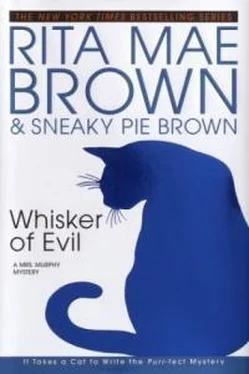“It takes them longer, but they do figure things out,” Pewter said between chews.
“We haven’t figured it out yet, Pewts. We just know that the murders are related.” Mrs. Murphy reached up, her claws digging into the tablecloth.
“Murphy!” Harry rapped her paw but gave her another piece of turkey nonetheless. Then she gave Pewter and Tucker a piece, as well.
“If that is Mary Pat, someone is going to be pretty darn nervous,” Tucker said.
While Harry and Miranda visited with each other, Fair was glued to his computer. What he was finding was extremely interesting, and he kicked himself for not thinking of it earlier.
45

N ewcomers to the country take some time to adjust to the pace of life. It’s not so much that it’s slower but that it often begins before sunup. If a person’s work is physical—like that of a farmer, a carpenter, a stone mason—folks from the North may think such a worker is lazy. Instead of working fast, the Southern worker keeps a slower but steady pace. It’s not until the Northerner labors in the heat that he or she can appreciate the wisdom of this approach.
Blair Bainbridge, when he first moved to Crozet from New York City, suffered the normal prejudices about Virginians. Being a gentleman, he kept them to himself. As years passed, he began to understand that people worked very hard but they didn’t make a show about it. He also began to understand that showing off your knowledge was not a good thing. The point was to bring people together, to be inclusive, not to set yourself above others. Even Mim Sanburne, for all her imperiousness, rarely tried to make someone else look stupid. As for Little Mim, her graciousness in the face of unpleasantness astonished him. In fact, the worse it got, the more gracious Little Mim became. That this was the ultimate social revenge had not yet occurred to him. Nor had it occurred to him that if he married Little Mim, there would still be things the family would never say in front of him. This was not because Mim, Jim, or Little Mim disdained Blair but rather because it took twenty years, at least, to comprehend the mere basics of manners and mores of Dixie. Just as aristocrats in old France had learned from birth how to move, how to address people, the various courtesies, and, above all, their own genealogy, so, too, did Southerners, regardless of station. It was bred in the bone.
Harry at six in the morning was inspecting the new beaver dam. She didn’t want to disturb their work, but if she ever could, she’d like to build a pond on this site with a small spillway below to the creek. Nature leeched out some of the water, but the beavers constructed a formidable dam, their lodges dotting the rough pond created by their effort. A blue heron and a green kingfisher worked the waters.
Green kingfishers are native to southern Texas and the tropics, not Virginia, but there was a beauty right on Harry’s farm. No doubt the shining fellow hadn’t read the National Audubon Society Field Guide to North American Birds .
On seeing the green kingfisher, his white collar immaculate, Harry made a mental note to call Nancy King, a friend who was an avid bird-watcher.
Insects buzzed around, squirrels romped, a doe with twin fawns raised her head from grazing to observe Harry and her companions. The doe often jumped into the large paddocks to graze with the horses. Sugar and Barry’s mares chatted contentedly under wide spreading oaks.
Crossing below the beaver dam, Harry scrambled up the creek bed. Trotting to the three-board fence line between her property and Blair’s, she put one hand on the top board and vaulted over, thrilled that she could do it. She’d been good at gymnastics in school.
Pewter scooted underneath. Mrs. Murphy, pretending to be one of the hunters, leapt between the lower board and the second board in the fence. Tucker, like Pewter, squeezed under.
They walked to the top of a low rise midway between the property line and Blair’s lovely farmhouse. The old Jones family graveyard, neatly set off by a wrought-iron fence with a curly filigree above the gate, promised peace when the end came. Bryson Jones, Herb’s impractical but beloved uncle, rested here, along with all the Joneses through the mid–eighteenth century. The married daughters over the centuries rested here, too. Surnames of Lamont, Taliaferro—pronounced Tolliver—and Sessoms slept with the Joneses. Sessoms is a Cherokee name, and the marriage of a Jones daughter to a Sessoms in the late eighteenth century became a cherished family story.
Leaning against a spectacular oak, Harry thought about three of her contemporaries gone to eternal rest—Barry, Sugar, and Jerome. She didn’t like to dwell on her own demise, but under the circumstances it was hard not to think about it.
“Tucker, ever notice that skulls are grinning?”
“Can’t say that I’ve thought about it,” the corgi replied seriously, the slanting rays of the early sun burnishing her coat red-gold.
“Don’t,” Pewter, sitting on a flat long slab, said. “Morbid.”
Just then a fat caterpillar, green with spiky outgrowths, traversed over her tail, all those caterpillar feet in her fur. Pewter jumped straight up, flipping the caterpillar onto another flat slab tombstone.
Harry, Mrs. Murphy, and Tucker laughed.
“Mighty Puss!” Murphy mocked her.
“Oh, shut up.” Pewter turned her back on them all, picked up her tail, and licked the fur back down.
The sky, a brilliant blue, promised a spectacular day.
Harry exhaled through her nose. “Up and at ’em.”
“Is she going to cut hay today?” Tucker wondered.
“Think so, but at the moment,” Mrs. Murphy paused as Harry opened the gate and headed toward Blair’s, “she’s going to pay a social call. Pewter, are you coming?”
“No, I’m going to stay here and commune with nature,” came the haughty reply.
“Oh, I thought the caterpillar was more nature than you could handle.” The tiger bounded out of the graveyard along with Tucker.
“I’ll show them. Bunch of snots. I’m not afraid of a caterpillar. It felt creepy, that’s all. Too many chubby legs, and there’s sticky stuff on the feet. O-o-o.” She wrinkled her nose as she turned to watch her family skip toward the farmhouse.
Her nemesis, the bluejay, zoomed into the oak, shrieked, squawked, shook the branches, and then, conceit to the max, floated down to perch on top of a vertical tombstone not four feet from Pewter, who was nursing her pride.
“Where’d you put the caterpillar, idiot cat?”
Pewter’s pupils widened. “What are you doing here?”
“Looking at your sorry self,” the jay whistled.
“I’m not sorry. I’m sitting here amongst the dead, which provokes me to philosophical musings.” She wished that the hateful bird were even six inches closer. She knew she’d nab him for sure then.
“Don’t make me regurgitate!” The bluejay’s topknot stood straight up as he laughed, which sounded like “queedle, queedle,” the little happy sound jays make.
“Actually, I didn’t think your range would be this far. There’s plenty to eat at our place.”
“I fly from one state to the other if I feel like it. Bluejays migrate, you know. Life’s too good here, so I stay. Course, right now it’s getting a little exciting, what with Tucker finding Mary Pat’s thigh bone. All the wild animals and birds are talking about it.”
Читать дальше













